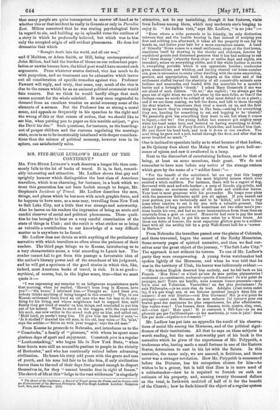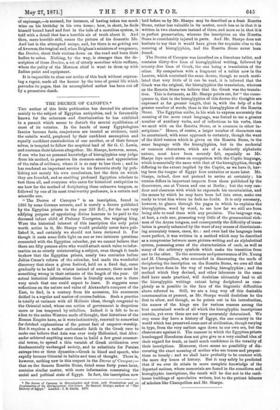MR. FITZ-HUGH LUDLOW'S HEART OF THE C ON TINENT.*
hit. FITZ-HUGH LUDLOW'S work deserves a longer life than com- monly falls to the lot of books of travel. It is, in fact, remark-
ably interesting and attractive. Mr. Ludlow shows that gay and sprightly humour which distinguishes the best class of American travellers, which is so charming, for instance, in a book which we trust this generation has not been foolish enough to forget, Mr. Stephens's Incidents of Travel. Mr. Ludlow describes the men, things, and places which he has seen with much graphic force, and he happens to have seen, as a man may, travelling from New York to Salt Lake City, not a little that was strange and noteworthy. Also he leaves on his readers the impression of being an acute and candid observer of social and political phenomena. These quali- ties he has brought to bear on a very careful examination of the state of things in Utah ; and the result is what strikes us as being as valuable a contribution to our knowledge of a very difficult matter as is anywhere to be found.
Mr. Ludlow does not detain us with anything of the preliminary aarrative with which travellers so often abuse the patience of their readers. The third page brings us to Kansas, introducing us to a very characteristic scene, a trial according to Lynch law. The reader cannot fail to get from this passage a favourable idea of the anther's literary power and of the soundness of his judgment, and he will get a specimen of the good stories in which this, like, indeed, most American books of travel, is rich. It is so good— mythical, of coarse, but, in the higher sense, true—that we must quote it :—
"I was expressing my surprise to an indigenous acquaintance made that morning, when he replied, 'Haven't been long in Kansas, have you?'—' Six hours,' I informed him.— Thought so. Lord bless you, nobody thinks anything of being hanged in this country ! Why, in one Kansas settlement there lived an old man who was too lazy to do any- thing for his living, and whose neighbours had to support him, until finally they got tired of sendin' on him things, and concluded to put him out of his misery. When he stood on the waggon, with the rope round his neck, one new settler in the crowd took pity on him, and called out, 'Hold hard, ye needn't hang him. I'll give him ten bushel o' corn.'— "le it shelled ?' drawled the old man, in his old, lazy voice.—' No, 'ta'nt,' says the settler.—'Drive on with your waggon,' Bays the old man."
From Kansas he proceeds to Nebraska, and introduces us to the 4g Comstocks," a family of "pioneers," with whom he spent some
glorious days of sport and enjoyment. Comstock pere is a regular " Leatherstocking," who began life in New York State, "when bear-hunts were still an accessible pastime to people in the vicinity of Rochester," and who has continually retired before advancing eivillization. He bears his sixty odd years with the grace and ease of youth, and his sons bid fair to be like him, if only civilization leaves them to the end of their days free ground enough to disport themselves in, for they "cannot breathe free in sight of fences." The sketch of life at this" lodge in the vast wilderness "is singularly
* The Heart of The Continent; a Record of Travel across the Plains and in Oregon, with an Examination of the Mormon Principles. ByFitz-Hugh Ludlow. London: Sampson Low, Son, and Marston. 1870.
attractive, not to say tantalizing, though it has features, visits from Indians among them, which may moderate one's longing to enjoy it. "An Indian visit," says Mr. Ludlow, "is no joke "
"Even where a tribe pretends to be friendly, its only distinction between that and the hostile bearing is, that instead of scalping you first and robbing you afterward, it takes all the property it can lay its hands on, and leaves your hair for a more convenient season. A band of friendly ' Sioux cornea to a small settlement, stops at the first house, emaciates itself by drawing in the cheeks and abdomen, denotes by sepulchral grunts and distressed gestures that it has had nothing to eat for three shneep ' (whereby throe sleeps or entire days and nights, are intended), seizes on everything edible, and if the white feather is shown it, everything portable which it can appreciate besides ; confiscates guns, ammunition, and whiskey, and having cleared out house number one, goes in succession to every other dwelling with the same emaciation, gesture, and appropriation, until it departs at the other end of the settlement stuffed beyond the elasticity of all conceivable animals save Indians and anacondas, and loaded with the materials for a month's barter and a fortnight's drunk.' I asked Mary Comstock if she was not afraid of such visitors. 'Oh no ! ' she replied ; we always get the guns out of sight when we are left alone by the men-folks, so that if the Indiana come we needn't be robbed of what must defend us on a pinch ; and if we see them coming, we bolt the doors, and talk to them through the shut window. Sometimes they steal a march on us, and the first thing we know they're swarming in like bees,—asking for everything they see, hunting for something to eat, and begging to be 'treated.' W.e generally give 'em everything they want to eat, but when it comes to liquor,—not we ! One young Indian last summer got mighty sassy when his band came here, and insisted on having something to drink. At last I got a bottle of Perry Davis's Painkiller, and handed him that. He just threw his head back, and took it down at one swallow. The next thing he gave such a v bolted through the door, and after that he never troubled me much.'"
One is inclined to speculate lazily as to what became of that Indian, as De Quincey does about the Malay to whom he gave half-an- ounce of opium and saw it swallowed in a lump.
Next to the discomfort of entertaining Indians, must be that of being, at least on some occasions, their guest. We do not remember to have seen before any notice of the strange custom which goes by the name of a "soldier feast :"— - - "For the benefit of the uninitiated. let me say that this happy banquet consists of a series of the most frightful messes which ever entered a witch cauldron. For instance, there will be a ragout of dog, flavoured with mud and sole-leather • a soup of lizards, pig-gristle, and wild onions ; an enormous salmis of old mule and sunflower leaves. Your host is most generous with his provender. He heaps your plate with the nauseous delicacies until you sit aghast. If you cannot eat your portion, you are technically said to be killed,' and have to buy some other convive to eat it for you with a valuable present. One elastic Indian of long practice will sometimes eat two other men's por- tions beside his own, and feel no more inconvenience from them than an anaconda from a goat au naturel. Moncrevie had once to pay the most valuable horse he had, to get his mess eaten by a Sioux brave. As these are debts of honour, the most capacious glutton goes to a soldier- feast with all the avidity felt by a gray Wall-Street bull for a corner in Harlem."
From Nebraska the travellers passed over the plains of Colorado, and these traversed, began the ascent of the Rocky Mountains. Some seventy pages of spirited narrative, and then we find our- selves near the great object of the journey, "The Salt Lake City." The approach is not without its terrors. To one of Mr. Ludlow's party they were overpowering. A young Swiss watchmaker had spoken lightly of the Mormons, and when he was told that he was in the territory of Utah, his horror was ludicrously evident :—
"His broken English deserted him entirely, and he fell back on his French. Mon Dieu! ce n'etait qu'une de men petites plaisanteries ! aeulement ca—senlement, seulanent—parole d'honneur! Jo n'ai point de prejuges, moi! Tonto ma familia, nous aommes francs-penseurs—mon frere eine eat Voltairien. Ventrebleu! un des plus preeminens I Jo anis Philosophe,—je no crois rien de tout. Adolphe Vest notre cadet
il n'a qua vingt ans, et sea liaisons montent jusqu'à deux lois ce numerb! il est vrai libertin—vrai Don Giovanni! Moi je n'ai point de prejugeB—quant aux Mormons, de mon enfance epronve pour ces braves gens des sentimens lea plus respecteuses, les plus affectionees. Que vonlez-vons ? Une femme, deux females, trois, quatre, cinq, cent, mil—c'est egal! Main qttoi ! Si je resterai a Salt-Lac—je ne me generals pas per l'arithmetique—je me marierais, je vons is jure ! deux foie par mois—regulier-r-r-r-ement.' "
Mr. Ludlow has put into an appendix the result of his observa- tions of social life among the Mormons, and of the political signi- ficance of their institutions. All that he says on these subjects is worth reading, but the most noteworthy part of his book is the narrative which he gives of the experiences of Mr. Polypeith, a tradesman who, having made a small fortune in one of the Eastern States, determines to cast in his lot with the Saints. In this narrative, the name only, we are assured, is fictitious, and there never was a stranger revelation. How Mr. Polypeith is summoned before the Dictator, has his occupation chosen for him—he wishes to be a grocer, but is told that Zion is in more need of a cabinetmaker—how he is required to furnish on oath an estimate of his property, and, naming twenty thousand dollars as the total is forthwith mulcted of half of it for the benefit of the Church ; how he finds himself the object of a regular system
of espionage,—is accused, for instance, of having taken too much wine on his birthday in his own home ; how, in short, he finds himself bound hand and foot in the toils of a merciless system, is told with a detail that has a horrible air of truth about it. And then, more horrible still, comes the picture of his domestic life. And last is the attempted escape, and, for there is no getting out of Avernus, the tragical end, when Brigham's ministers of vengeance, the Danites, shoot their victims down on the road and burn their bodies to ashes. Nothing, by the way, is stranger than the de- scription of these Danites, a set of utterly merciless white ruffians, whom the policy of the Mormon chief is wont to dress up with Indian paint and equipment.
It is impossible to close our notice of this book without express- ing a regret, made all the keener by the tone of genial life which pervades its pages, that its accomplished author has been cut off by a premature death.



































 Previous page
Previous page